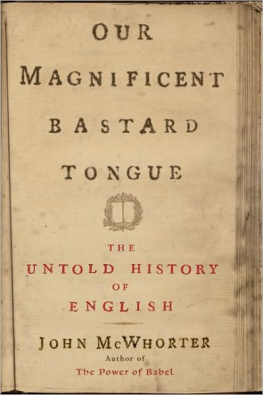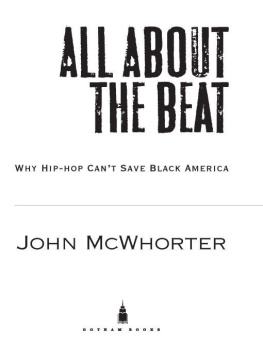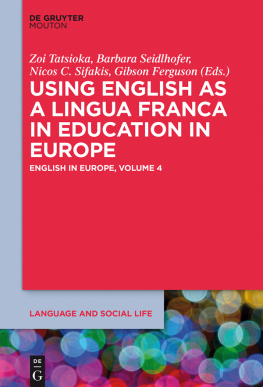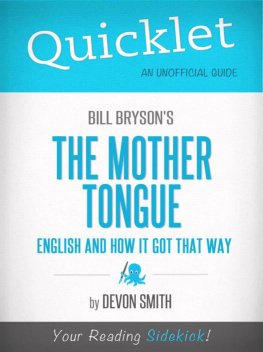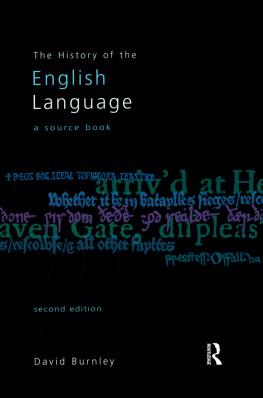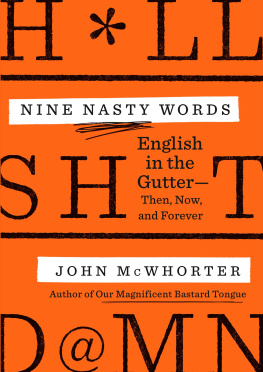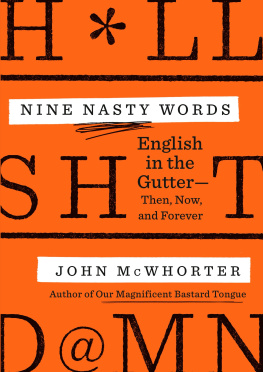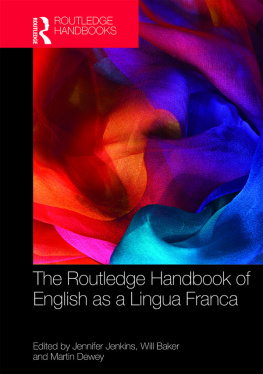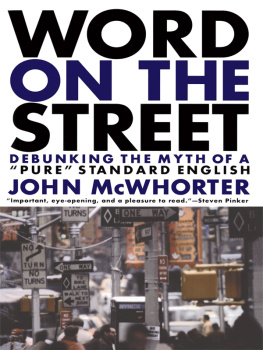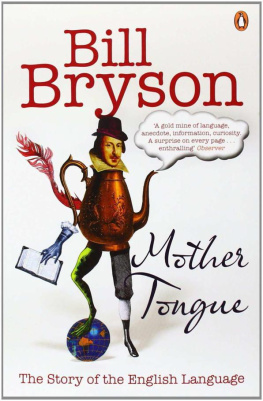Table of Contents
ALSO BY JOHN MCWHORTER
TOWARDS A NEW MODEL OF CREOLE GENESIS
THE MISSING SPANISH CREOLES:
Recovering the Birth of Plantation Contact Languages
WORD ON THE STREET:
Debunking the Myth of a Pure Standard English
SPREADING THE WORD:
Language and Dialect in America
LOSING THE RACE:
Self-Sabotage in Black America
THE POWER OF BABEL:
A Natural History of Language
AUTHENTICALLY BLACK:
Essays for the Black Silent Majority
DOING OUR OWN THING:
The Degradation of Language and Music and
Why We Should, Like, Care
DEFINING CREOLE
WINNING THE RACE:
Beyond the Crisis in Black America
ALL ABOUT THE BEAT:
Why Hip-Hop Cant Save Black America
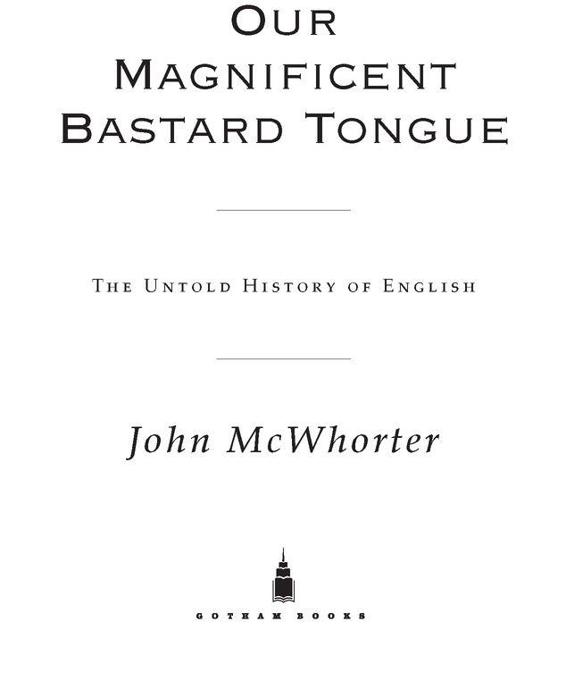
GOTHAM BOOKS
Published by Penguin Group (USA) Inc.
375 Hudson Street, New York, New York 10014, U.S.A.
Penguin Group (Canada), 90 Eglinton Avenue East, Suite 700, Toronto,
Ontario M4P 2Y3, Canada (a division of Pearson Penguin Canada Inc.) Penguin Books
Ltd, 80 Strand, London WC2R 0RL, England Penguin Ireland, 25 St Stephens Green,
Dublin 2, Ireland (a division of Penguin Books Ltd) Penguin Group (Australia),
250 Camberwell Road, Camberwell, Victoria 3124, Australia (a division of Pearson
Australia Group Pty Ltd) Penguin Books India Pvt Ltd, 11 Community Centre, Panchsheel
Park, New Delhi - 110 017, India Penguin Group (NZ), 67 Apollo Drive, Rosedale, North
Shore 0632, New Zealand (a division of Pearson New Zealand Ltd) Penguin Books
(South Africa) (Pty) Ltd, 24 Sturdee Avenue, Rosebank, Johannesburg 2196, South Africa
Penguin Books Ltd, Registered Offices: 80 Strand, London WC2R 0RL, England
Published by Gotham Books, a member of Penguin Group (USA) Inc.
First printing, November 2008
Copyright 2008 by John McWhorter
All rights reserved
Gotham Books and the skyscraper logo are trademarks of
Penguin Group (USA) Inc.
LIBRARY OF CONGRESS CATALOGING-IN-PUBLICATION DATA
McWhorter, John H.
Our magnificent bastard tongue: the untold history of English / John McWhorter.
p. cm.
Includes bibliographical references.
eISBN : 978-1-592-40395-0
Without limiting the rights under copyright reserved above, no part of this publication may be reproduced, stored in or introduced into a retrieval system, or transmitted, in any form, or by any means (electronic, mechanical, photocopying, recording, or otherwise), without the prior written permission of both the copyright owner and the above publisher of this book.
The scanning, uploading, and distribution of this book via the Internet or via any other means without the permission of the publisher is illegal and punishable by law. Please purchase only authorized electronic editions, and do not participate in or encourage electronic piracy of copyrighted materials. Your support of the authors rights is appreciated.
While the author has made every effort to provide accurate telephone numbers and Internet addresses at the time of publication, neither the publisher nor the author assumes any responsibility for errors, or for changes that occur after publication. Further, the publisher does not have any control over and does not assume any responsibility for author or third-party Web sites or their content.
http://us.penguingroup.com
Introduction
Was it really all just about words?
The Grand Old History of the English Language, I mean. The way it is traditionally told, the pathway from Old English to Modern English has been a matter of taking on a great big bunch of words. Oh, yeah: and shedding a bunch along the way.
You may well know the saga already. Germanic tribes called Angles, Saxons, and Jutes invade Britain in the fifth century. They bring along their Anglo-Saxon language, which we call Old English.
Then come the words. English gets new ones in three main rounds.
Round One is when Danish and Norwegian Vikings start invading in 787. They speak Old Norse, a close relative of Old English, and sprinkle around their versions of words we already have, so that today we have both skirts and shirts , dikes and ditches . Plus lots of other words, like happy and their and get .
Round Two: more words from the Norman French after William (i.e., Guillaume) the Conqueror takes over Englaland in 1066. For the next three centuries, French is the language of government, the arts, and learning. Voil, scads of new words, like army , apparel, and logic .
Then Round Three: Latin. When England falls into the Hundred Years War with France, English becomes the ruling language once more, and English writers start grabbing up Latin terms from classical authors abrogate and so on.
Too, there are some Dutch words here and there ( cookie , plug ), and a little passel from Arabic ( alcohol , algebra ). Plus today we have some from Spanish, Japanese, etc. But those usually refer to objects and concepts directly from the countries in question taco , sushi and so its not precisely a surprise that we use the native words.
These lexical invasions did leave some cute wrinkles here and there. Because when French ruled the roost, it was the language of formality; in modern English, words from French are often formal versions of English ones considered lowly. We commence because of French; in a more mundane mood we just start , using an original English word. Pork, trs culinary, is the French word; pig trs beastlyis the English one. And then even cuter are the triplets, where the low-down word is English, the really ritzy one is Latin, and the French one hovers somewhere in between: Anglo-Saxon ask is humble; French-derived question is more buttoned up; Latinate interrogate is downright starchy.
But theres only so much of that sort of thing. Overall the Grand Old History is supposed to be interesting by virtue of the sheer volume of words English has taken on. We are to feel that it is a good, and perhaps somehow awesome, thing that English has been open to so many words.
Yet even that doesnt hold up as well as often implied. Throughout the world, languages have been exchanging words rampantly forever. Languages, as it were, like sex. Some languages resist it to an extent for certain periods of time depending on historical circumstances, but no language is immune. Over half of Japanese words are from Chinese, and never mind how eagerly the language now inhales English words. Almost half of Urdus words are Persian and Arabic. Albanian is about 60 percent Greek, Latin, Romanian, Turkish, Serbian, and Macedonian, and yet it is not celebrated for being markedly open to new words. Rather, quite simply, Albanians have had a lot of close interaction with people speaking other languages, unsurprisingly their vocabulary reflects it, and no one bats an eye. The same has been true with Englishand Persian, Turkish, Vietnamese, practically every Aboriginal language in Australia, and... well, you get the point.
As such, the lesson that the difference between Old English and Modern English is a whole lot of new words is, for me, something of a thin gruel.
Dont get me wrongwords are nice. I like them. I am no more immune than the next person to taking pleasure in tasty etymologies such as that the word tea started way off in one dialect of Chinese, was taken up by Malays, and subsequently by the Dutch traders in their lands as thee , and was first pronounced tay, coming to be pronounced tee only later, while that same ea spelling is still pronounced ay in names like Reagan .
Yet my impatience with the word fetish of typical popular treatments of The History of English is based in the fact that I happen to be a linguist. Etymology is, in fact, but one tiny corner of what modern linguistic science involves, and linguists are not formally trained in it. Any of us sought for public comment are familiar with the publics understandable expectation that to be a linguist is to carry thousands of etymologies in ones head, when in fact, on any given question as to where a word comes from, we usually have to go searching in a dictionary like anyone else.
Next page
